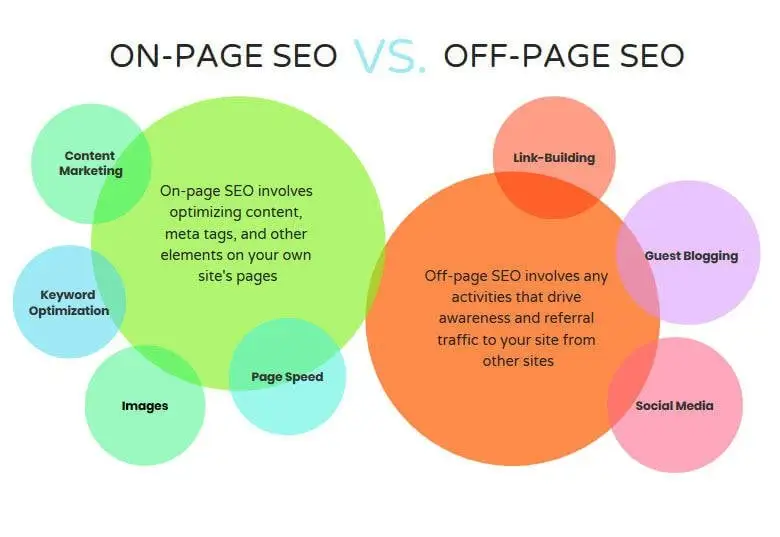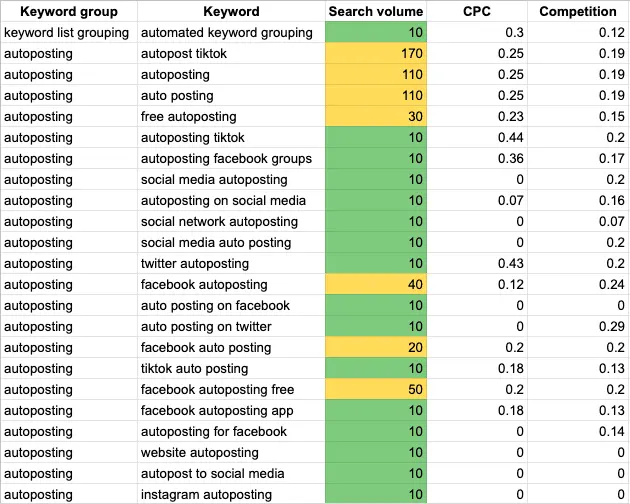
On-Page SEO: A Step-by-Step Guide to Making the Most of Your Website
Using “on-page SEO” techniques that work is crucial to digital marketing. On-page search engine optimization is the process of improving the search engine results and attracting more relevant visitors to specific websites.
Little changes to your website will make it talk to search engine algorithms.
This piece will explain what On Page SEO is, why it’s important, and how it’s different from Off Page SEO.
What does On Page SEO mean?
On-Page SEO includes all the things you can do on your website itself to make it rank higher in search results. This includes making your content, a page’s HTML source code, and the site’s speed and user experience better as a whole.
Off-Page vs. On-Page SEO
For a complete SEO plan, you need to know the difference between On Page SEO and Off Page SEO. Even though these two parts of SEO are different, they work together to boost a website’s search engine results.
On Page SEO is the base of your website’s SEO.
On-Page SEO is all about making your website’s parts work better. This is where you can make any changes you want to improve how well your site does in search engine results pages (SERPs).
Some important parts of On Page SEO are:
- Content Quality: Making content that is useful, interesting, and informative and meets your audience’s wants.
- Use key terms in your content: titles, and meta descriptions for the most possible website exposure.
- Making that the organization: makes sense and is user-friendly enhances “site architecture”.
- Performance: of a website includes user experience overall, page load speed optimization, and compatibility with mobile devices.
- HTML Tags: Title tags, headers, and alt text should all be used correctly in HTML tags to help search engines understand what your content is about.
On-Page SEO is often thought of as the base of your SEO work. By optimising these parts of your site, you not only make it more appealing to search engines, but you also make it better for people to use, which is becoming more and more important to search engine algorithms.
Off-Page SEO: Getting people to trust your website
Off-Page SEO includes things you do that aren’t on your website that can change where you rank in SERPs. Building the site’s image and authority is a big part of this part of SEO, which has a big effect on how search engines see your site.
Some important parts of off-page SEO are:
- Backlinks: One of the most important Off Page SEO tactics is to get high-quality backlinks from trustworthy websites. When other sites link to your content, it tells search engines that other sites trust it.
- Social media marketing: While social media signals do not directly affect search rankings, having a strong social media profile can help you gain more backlinks.
- Guest blogging and collaboration: Writing for other websites or collaborating with notable individuals can help you reach a larger audience and improve the credibility of your website.
- Managing Your Online Reputation: Monitoring reviews and mentions of you on various websites may have an unexpected impact on your SEO strategies.
Off-page SEO appears to be more sophisticated than on-page SEO, yet it is equally crucial. Both On Page and Off Page work must be balanced in order for an SEO plan to be complete.
Good information (On Page) can bring in good backlinks (Off Page), and the other way around. So, focusing on just one thing can make it harder for your site to get better rankings and more traffic.

Why does it matter?
On-Page SEO is not only an important part of search engine optimisation, it’s also the most important part of how your website talks to search engines and people. It’s important for a few main reasons:
- Better Search Engine Rankings: On-Page SEO helps search engines understand your content, which helps you move up in the search results.
- Enhanced User Experience: This means making the website easier for people to use by making it faster, easier to navigate, and more satisfied overall.
- Increased Organic Traffic: On Page SEO targets relevant terms to bring in a more focused audience, which means that the traffic will last longer.
- Higher Trust and Credibility: If your website has a high search score, people will be more likely to trust and believe it.
- Competitive Advantage: If you conduct On Page SEO correctly, you can get ahead of your competitors and potentially get a larger share of the web traffic they receive.
- Overtake your competitors‘ on-page SEO to increase your site traffic.
- Beats competitors in: By beating them in on-page SEO, you can get a bigger share of their online website traffic.
- Fairly priced marketing: Businesses looking for cost savings quickly find that on-page SEO is a very affordable strategy.
To Do List for On-Page SEO
Here is a complete list of things you should do to properly optimise your site:
1. Analyzing an internet site for search engine optimization
Go over your website extremely thoroughly to start in order to find places that need repair. This includes looking at how your website is now organized, doing SEO, and with a special emphasis on user interaction, page load time, and content quality metrics.
2. Keyword Research
Do a lot of study on keywords to find out what your audience is looking for and then target those keywords. To do this, you need to find useful, high-volume keywords and also think about long-tail keywords for more targeted traffic.

3. SEO Page Title
Write page titles that are catchy, full of keywords, and correctly describe the content of each page.Search engines and users should be able to comprehend the purpose of your page from its brief and unambiguous title.
4. The Meta Description
Give every page a brief yet interesting meta description. These snippets should include a brief synopsis of the page’s material together with focused keywords.Well written meta descriptions can boost the amount of clicks on search engine results pages.
5. Optimum for SEO Domain Name or URL Structure
Put vital keywords in your brief, understandable URLs. Well-structured URLs scan well for search engines. Users also have a better experience because the URL is easy to read and understand.

6. Keyword density
Try to include keywords into your work in a fair amount of balance. Contextual keywords should be easily included into your writing without making it unduly wordy. It could also make your writing harder to read and get you into trouble with search engines.
7. Quality of the content, relevance, keyword placement, and readability
Make very excellent, readable, and often utilized keyword material.Naturally include keywords to support the message of the content and give your readers pertinent information.
8. Web links
Use internal links to take viewers to material related to what they are now watching.More helpful content improves user experience and increases the page authority on your website.
9. Enhancements of visual components or multimedia.
Check that every image and multimedia on your website loads quickly. Images are compressed and key word alt tags are added to improve page load times and SEO.
10. Formatting for schemas
To make your material correctly understandable by search engines, include schema code. Thanks to this organized information, search engines can understand the subject of your product and its relationships to other products. Search engine result pages should show your website higher right away.

By carefully working on each of these areas, you can make your site better for both users and search engines. This will increase traffic, make your site more visible, and keep people interested.
Should you get On Page SEO help?
Whether or not to hire professional On Page SEO services will rely on how complicated your website is, how knowledgeable you are, and what resources you have. Furthermore supporting arguments for the need of professional help consist of:
background and talents
- Expert Opinion: SEO professionals may offer a plethora of information and skills.They keep current on the most recent developments and modifications to search engine algorithms in the always evolving field of search engine optimization.
- Professionally made websites: will satisfy your requirements, adhere to industry norms, and be visually appealing to visitors.
Effective time and material use
- Time-saving: It can take some time for people with minimal SEO skills. Working with a service frees you up to focus on other areas of your business.
- Sharing Resources: Professionals can pay for and use the tools and resources required to carry out in-depth SEO research and implementation; you may not be able to.
Fully Managed SEO Services
- Overall Optimization: On Page SEO services employ a wide perspective that covers everything from technical adjustments to keyword research, working on more than just one aspect of SEO.
- Checks and Updates on a Regular Basis: SEO is not a one-time event. Experts can monitor the performance of your website and effect necessary adjustments.
A market advantage
- Having an SEO specialist optimise your website might provide you a significant advantage over competitors if you’re in a market with many other companies as they might not have as much optimisation.
Measurable Results and ROI
- Return on Investment (ROI): Hiring SEO services does cost money up front, but the long-term ROI can be big, especially if better rankings lead to more traffic and sales.
Dealing with Risk
- Avoiding Penalties: If you’re not good at SEO, you might make mistakes that get you in trouble with search engines. Professionals know how to make your site work better for search engines while still following their rules.
Made to Fit Your Needs
- Ability to grow: SEO services can adapt their work to fit your needs, no matter how big or small your website or e-commerce platform is.
Last thoughts
On-page SEO is the practice of making small changes to your website so that it works well for both people and search engines. Every part of On Page SEO helps build a stronger online footprint, from writing interesting content and optimising meta tags to making sure the site works well on mobile devices and making the user experience better.
A never-ending process, on-page SEO is not a one-time event. And your strategy should evolve along with search engine formulae.
Whether they do it themselves or employ someone else to do it for them, every website that wants to succeed in the digital era must undertake on page SEO.
FAQs
What does On-Page SEO mean?
On-Page SEO is the process of making specific web pages rank better in search engines.
What does Off-Page SEO mean?
Off-Page SEO is the term for things that are done on other websites that have an effect on how well your website ranks in search engine results.
When 2024 arrives, how will on-page SEO look?
2024 will still see on-page SEO as creating great content, making sure the user has a good experience, and optimising HTML components.
How Are Off-Page and On-Page SEO Techniques Used?
Off-page SEO really focuses on factors like backlinks that are not on your website; on-page SEO is improving elements of your website.
Exists off-page optimization in SEO anymore?
Off-page SEO is still very important, in fact, especially when it comes to building high-quality backlinks.
Why is it important to optimize pages on the website?
On-page SEO is essential if search engines are to understand and rank your material highly.
What is the best score for on-page SEO?
The best On Page SEO score is different for each page, but in general, it means that your page is well optimised according to SEO best practices.
Step by Step On-Page SEO?
Start with the SEO page analysis checklist in this piece and end with the mobile friendliness checklist.
What does this not show about on-page SEO?
Building links and selling on social media sites are not examples of On Page SEO.
Do all of my pages need SEO?
If possible, yes. To get the most out of search engines, every page should be optimised for them.
For Beginners: How to Do SEO?
Start by learning the basics of SEO and working on On Page SEO elements. Keep learning and changing as needed.
Why do you need a backlink for SEO?
When one website links to another, this is called a backlink. Search engines see this as a vote of trust and authority.
Do you know a lot about this? We’re always looking for new ways to add unique insights and deep knowledge to our material. If you have useful information to share, you might want to write for us. We’ll give you credit for your work so that our huge audience can see how knowledgeable you are. Feel free to email editor@freeonlinedirectory.in to begin.












